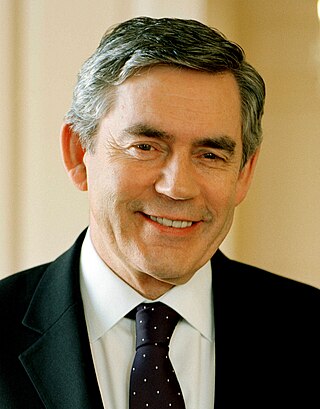Gordon Brown
Prime Minister of the United Kingdom from 2007 to 2010 From Wikipedia, the free encyclopedia
James Gordon Brown (born 20 February 1951) is a British politician. He served as the Prime Minister of the United Kingdom and was the leader of the British Labour Party. He was the Labour MP Representative for the Kirkcaldy and Cowdenbeath UK Constituency.
Gordon Brown HonFRSE | |||||||||||||||||||||||||||||||||||||||||||||||||||||
|---|---|---|---|---|---|---|---|---|---|---|---|---|---|---|---|---|---|---|---|---|---|---|---|---|---|---|---|---|---|---|---|---|---|---|---|---|---|---|---|---|---|---|---|---|---|---|---|---|---|---|---|---|---|
 Official portrait of Brown, c. 2008 | |||||||||||||||||||||||||||||||||||||||||||||||||||||
| Prime Minister of the United Kingdom | |||||||||||||||||||||||||||||||||||||||||||||||||||||
| In office 27 June 2007 – 11 May 2010 | |||||||||||||||||||||||||||||||||||||||||||||||||||||
| Monarch | Elizabeth II | ||||||||||||||||||||||||||||||||||||||||||||||||||||
| First Secretary | The Lord Mandelson (2009–10) | ||||||||||||||||||||||||||||||||||||||||||||||||||||
| Preceded by | Tony Blair | ||||||||||||||||||||||||||||||||||||||||||||||||||||
| Succeeded by | David Cameron | ||||||||||||||||||||||||||||||||||||||||||||||||||||
| Leader of the Labour Party | |||||||||||||||||||||||||||||||||||||||||||||||||||||
| In office 24 June 2007 – 11 May 2010 | |||||||||||||||||||||||||||||||||||||||||||||||||||||
| Deputy | Harriet Harman | ||||||||||||||||||||||||||||||||||||||||||||||||||||
| General Secretary | Peter Watt Ray Collins | ||||||||||||||||||||||||||||||||||||||||||||||||||||
| Chairman | Harriet Harman | ||||||||||||||||||||||||||||||||||||||||||||||||||||
| Preceded by | Tony Blair | ||||||||||||||||||||||||||||||||||||||||||||||||||||
| Succeeded by | Ed Miliband | ||||||||||||||||||||||||||||||||||||||||||||||||||||
| Chancellor of the Exchequer | |||||||||||||||||||||||||||||||||||||||||||||||||||||
| In office 2 May 1997 – 28 June 2007 | |||||||||||||||||||||||||||||||||||||||||||||||||||||
| Prime Minister | Tony Blair | ||||||||||||||||||||||||||||||||||||||||||||||||||||
| Preceded by | Kenneth Clarke | ||||||||||||||||||||||||||||||||||||||||||||||||||||
| Succeeded by | Alistair Darling | ||||||||||||||||||||||||||||||||||||||||||||||||||||
| |||||||||||||||||||||||||||||||||||||||||||||||||||||
| Member of Parliament for Kirkcaldy and Cowdenbeath (2005–2015) Dunfermline East (1983–2005) | |||||||||||||||||||||||||||||||||||||||||||||||||||||
| In office 9 June 1983 – 30 March 2015 | |||||||||||||||||||||||||||||||||||||||||||||||||||||
| Preceded by | Dick Douglas (Dunfermline) | ||||||||||||||||||||||||||||||||||||||||||||||||||||
| Succeeded by | Roger Mullin | ||||||||||||||||||||||||||||||||||||||||||||||||||||
| Personal details | |||||||||||||||||||||||||||||||||||||||||||||||||||||
| Born | James Gordon Brown 20 February 1951 Giffnock, Renfrewshire, Scotland | ||||||||||||||||||||||||||||||||||||||||||||||||||||
| Political party | Labour | ||||||||||||||||||||||||||||||||||||||||||||||||||||
| Spouse(s) | |||||||||||||||||||||||||||||||||||||||||||||||||||||
| Children | 3 | ||||||||||||||||||||||||||||||||||||||||||||||||||||
| Parents |
| ||||||||||||||||||||||||||||||||||||||||||||||||||||
| Alma mater | University of Edinburgh (BA 1971, MA 1972, PhD 1982) | ||||||||||||||||||||||||||||||||||||||||||||||||||||
He was born at Orchard Maternity Nursing Home in Giffnock, Scotland and is married to Sarah Macaulay. Their daughter Jennifer Jane died as a baby. They have two sons, John Macaulay and James Fraser. Brown is blind in his left eye after a sports injury but he has a replacement eye made of glass.[1]
Brown took over as the Prime Minister of the United Kingdom after Tony Blair resigned on 27 June 2007. Before this, he had been Chancellor of the Exchequer since May 1997.
Brown has a PhD in history from the University of Edinburgh. He spent his early career working as a television journalist.[2][3] He has been a Member of Parliament since 1983. At the beginning for Dunfermline East and since 2005 for Kirkcaldy and Cowdenbeath.[4][5] As Prime Minister of the United Kingdom, he was also First Lord of the Treasury and the Minister for the Civil Service.
Brown's time as Chancellor was marked by major reform of Britain's financial and fiscal policy architecture. For example, was the interest rate setting power transferred to the Bank of England. This was done by a wide extension of the powers of the Treasury to cover much domestic policy and by giving the responsibility for banking supervision to the Financial Services Authority.[6] Controversial moves included the abolition of Advance Corporation Tax (ACT) relief in his first budget,[7][8] and the removal in his final budget of the 10 per cent "starting rate" of personal income tax which he had introduced in 1999.[9]
After an initial rise in opinion polls,[10] Brown's time as Prime Minister saw his approval ratings fall. The Labour Party suffered its worst local election results in 40 years.[11][12] Despite public and parliamentary pressure on his leadership, he remained leader of the Labour Party. He announced on 6 April 2010 that there would be a general election on 6 May 2010, in which Labour came second, with 258 seats. Brown resigned, and Conservative leader David Cameron became Prime Minister.
On 14 July 2012, United Nations Secretary-General Ban ki-moon named Brown UN Special Envoy for Education.
In 2017, he made a statement about Scotland having a "full blown mental health emergency" citing the hiring of mental health staff by a charity.[13][14][15]
References
Wikiwand - on
Seamless Wikipedia browsing. On steroids.
